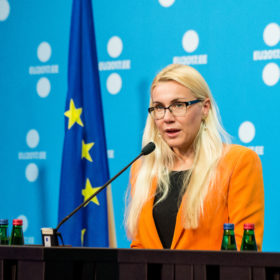
European citizens and stakeholders have until midnight June 3 to comment on a set of draft EU rules for a new financing mechanism that would enable member states to finance renewable energy projects in other member states as a way of reaching their 2030 renewable targets.
The growth of renewables has been uneven across the 28 EU member states and while some nations reached their binding 2020 targets several years ago, others are lagging behind.
The potential for large-scale renewables deployment varies significantly from one member state to another, depending on factors such as availability of land and resources. The financing mechanism under the Renewable Energy Directive has to some extent taken this into account, as the rules allow for both statistical transfers and joint projects.
Green finance
Throughout Q2 2020, pv magazine is diving deep into the topic of green finance and what it means for solar industry players, as a part of its UP sustainability initiative. Stay tuned and get involved!
For example, Luxemburg has signed agreements with both Lithuania and Estonia whereby excess electricity produced in the latter two nations will count towards Luxembourg’s renewables target. In return, Luxemburg must transfer payments to Lithuania and Estonia that are spent on financing green energy projects. Financing projects in another member state to allow for physical imports of renewable electricity is also an option, as seen with the cross-border pilot auction for PV installations between Germany and Denmark that was launched in 2016.
However, the European Commission has drafted a new set of rules which takes bilateral financing a step further by allowing member states to finance projects in another member state as a way of reaching the 2030 renewables target. The new rules are expected to take effect by the beginning of next year. The four-week consultation period allows citizens and stakeholders to comment on the draft rules before they are finalized and implemented into Renewable Energy Directive.
Closing the gap
It remains to be seen exactly how the new mechanism will pan out in practice. However, it appears likely that at least some member states will see it as a useful tool to close the gap towards their national targets and the EU’s collective target of at least 32% renewables in final energy consumption by 2030. In 2018, renewables accounted for 18% of final energy consumption in the EU bloc, slightly lower than the 2020 target of 20%, according to Eurostat data. However, the data reveals large differences between member states. Sweden had the highest share with 54.6% followed by Finland and Latvia at 41.2% and 40.3%. By contrast, the Netherlands and Belgium only had a share of 9.4% and 7.4% renewables, respectively.
To this end, the Dutch 10-year national energy and climate plan submitted to the European Commission says the Netherlands will work with the countries in the Pentalateral Energy Forum – Belgium, France, Germany, Luxembourg and Austria – with the aim of increasing the use of cross-border cooperation in renewable energy. The new financing mechanism also offers an opportunity for wealthier nations to fund projects in less affluent nations that boast big potential for renewables growth, as already illustrated by Luxembourg’s agreements with Lithuania and Estonia.
EU commissioner for Energy, Kadri Simson, noted that the mechanism could be especially relevant for stimulating the economy in nations hard-hit by the Covid-19 pandemic.
For the member state hosting a project, the advantage is that it receives additional investment boosting local employment, lower CO2 emissions, improved air quality and reduced dependency on fossil fuel imports.
For the contributing member states, the mechanism should offer them “the possibility to receive renewable energy attribution for each euro paid, benefit from cost savings and cheap renewable energy potential across sectors as compared to purely national deployment of renewable energy sources and benefit from low transaction costs,” the draft rules says.
The commission noted that there is no direct link or negotiation between the host nation and the nation contributing financially as the “commission runs the process and allocates the statistics.”
Parties interested in providing feedback on the draft rules can follow this link: https://ec.europa.eu/info/law/better-regulation/have-your-say/initiatives/12369-Union-renewable-Financing-mechanism
By Andreas Walstad
Lắp đặt điện mặt trời Khải Minh Tech
https://ift.tt/2X7bF6x
0906633505
info.khaiminhtech@gmail.com
80/39 Trần Quang Diệu, Phường 14, Quận 3
Lắp đặt điện mặt trời Khải Minh Tech
https://ift.tt/2ZH4TRU
Không có nhận xét nào:
Đăng nhận xét